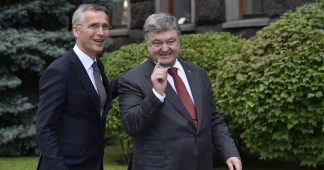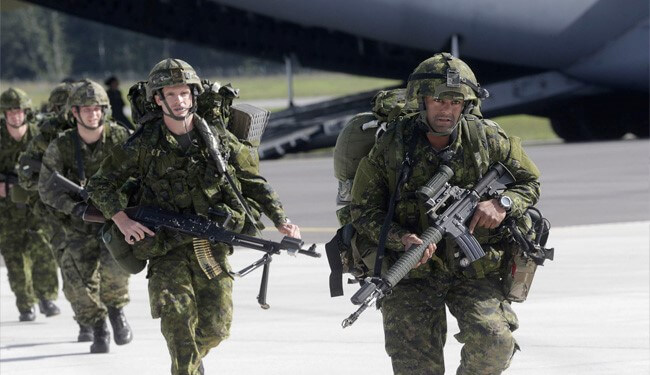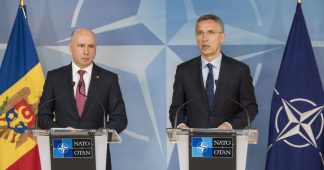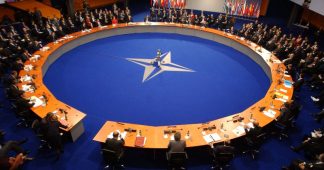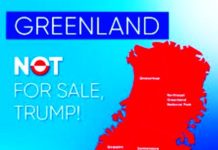By Alex GORKA
11.06.2018
On June 9, a statement attesting to the creation of the Ukraine-Moldova-Georgia Inter-Parliamentary Assembly was signed by the heads of those parliaments in Kiev. It declared that the three nations are united in their goal to oppose Russia and to strive for closer integration with the EU and NATO.
Of course this event must be viewed in its proper context.
On May 28, the NATO Parliamentary Assembly declared its support for Georgia and Ukraine’s hopes of joining the alliance. A proposal regarding Georgia’s expedited entry into NATO has been floated recently, as the bloc’s summit in July draws closer. The plan submitted for consideration by the American Heritage Foundation offers a “creative way around” the territorial problems with Abkhazia and South Ossetia. The alliance could amend the Washington Treaty by temporarily excluding the two entities recognized by Russia as independent states from NATO’s Article 5 protection. That proposal is being studied by Georgia’s parliament.
Last month, Tbilisi went to the European court of human rights in Strasbourg to accuse Russia of war crimes that were allegedly carried out in August 2008. Back then it was Georgia that was committing an act of aggression by attacking South Ossetia and the Russian peacekeepers, but 10 years later it is portraying itself as an innocent victim — another example of the pot calling the kettle black. That country has vigorously pursued the “more NATO in Georgia and more Georgia in NATO” concept, contributing to NATO operations and becoming part of the bloc’s institutions. Last year, the US administration voiced its support of Georgia’s NATO membership but did little afterwards to back those words up with any deeds.
Ukraine already plays host to the American military and receives lethal weapons from the US. It has recently appealed to Germany and France to support its NATO bid. Ukraine’s president has received an invitation to take part in the upcoming NATO summit.
Moldova is on its way to becoming a foothold for the US military and is embracing NATO. It has announced its decision to buy lethal weapons from the pact’s members. Chisinau is demanding that Russia’s military withdraw from Transnistria immediately and unconditionally. That government is openly unfriendly toward Moscow and does everything to heighten tensions between the two countries.
In March, Ukraine, Georgia, and Moldova joined together to form an anti-Russian political and military alliance, reviving the GUAM organization with Azerbaijan, which is ready to cooperate but prefers to keep its distance from the anti-Moscow agenda, thus making it more of a GUM than a GUAM when it comes to opposing Russia.
Now, let’s have a look at what’s in store for this newly formed bloc, which is so hostile to Moscow.
Presidential elections will be held in Georgia in October 2018. The country has been weathering a storm of popular protests. Economic and social hardships are fueling public discontent. Standards of living have stagnated. Falling prices for some exports have reduced spending power. In 2016, the country signed an EU Association Agreement with the European Union. As a result, in the next few years European regulations will be introduced although the benefits of that trade regime will remain out of reach. The country is known for the corruption of its law enforcement agencies. There is no broad political consensus regarding the ongoing constitutional reforms. Full-fledged membership in Western organizations (NATO and the EU) remains a pipe dream. Some nations that have been accepted as members in the past were even less prepared to meet the requirements, but entry into these Western blocs that are focused on other problems still remains out of reach for Georgia. All it gets is promises.
The Ukrainian presidential election is to be held in late March 2019 despite the voters’ mistrust of the authorities. President Poroshenko’s chances of reelection are rather slim. He is polling behind several other candidates. Former Prime Minister Yulia Tymoshenko is leading the polls. The country is facing increasing debt pressure. The risk of instability is high. Foreign investors and human capital are leaving the country. Ukraine remains poor — it is the only former Soviet republic in Europe that has never surpassed its GDP level from its days back in the USSR. Corruption, favoritism, and the power of its oligarchs are undermining Ukraine’s economy. The nation’s future looks bleak.
Moldova struggles with an overwhelming tide of corruption. Economic reforms have been carried out at a sluggish pace. The country is nearly wholly dependent on Russian gas imports via the pipeline system that passes through Ukraine. Moldova remains one of Europe’s poorest countries, with an annual per capita GDP of $2,280 in 2017. The nation is facing a parliamentary election in late November. The Socialist Party, led by pro-Russian President Igor Dodon, is predicted to win and change the country’s foreign policy. The ruling pro-Western Democratic Party has dismal ratings.
The three countries face the same problems: rule by oligarchs, a process of reform that is slow or nonexistent, relatively poor economic performance, and extremely remote prospects for joining Western organizations as full-fledged members. They are given special partner status, which sounds fine but in reality means little. The ruling elites feed the people promises that never come true. Their anti-Russian stance has never made anyone prosperous or secure. On the contrary, joining NATO and becoming springboards for potential attacks will only undermine their security, turning them into targets for the Russian military. Moscow has warned against moving the Western alliance to its borders.
Since Moldova will soon be out, the anti-Russian bloc will be short-lived. Georgia has its own problems as a South Caucasian nation. Those two countries have little to offer each other except vocal support. None of the three GUM bloc members has received massive economic aid from the West or has been treated as an equal by any leading Western nations. None of them, no matter how they try, can break all ties with Russia, due to the realities of geography and economics. None of them is expected to be greeted with open arms in the EU or NATO. The formation of this bloc can be used for propaganda purposes, but in reality it’s nothing but a flash in the pan that will soon be forgotten. It has no future.
Photo: azertag.az
Published at https://www.strategic-culture.org/news/2018/06/11/moldova-ukraine-georgia-alliance-nothing-more-than-flash-pan.html
